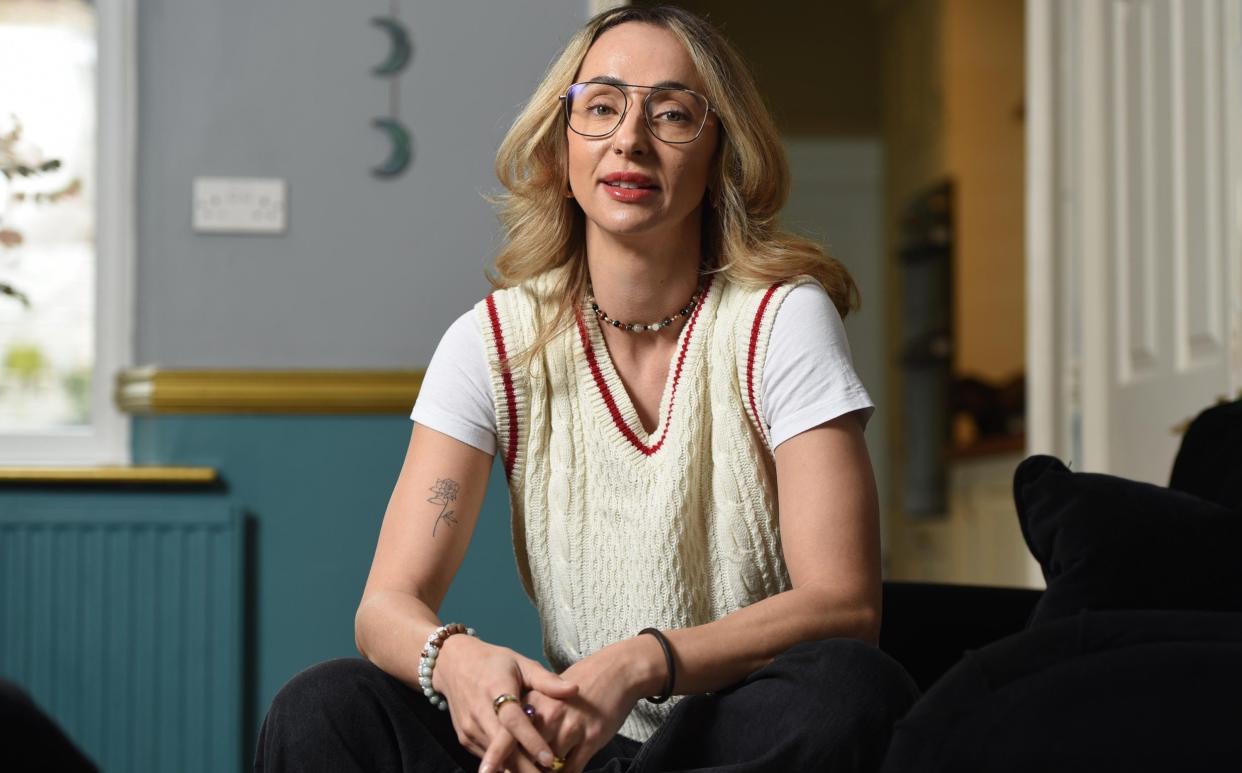My PMS was so bad I wanted to die

A year and a half ago, I typed seven words into Google. A few clicks later, and what showed on my screen described me exactly. The result filled me with relief, but also, panic. What came next?
The words I’d typed were “hormone problems in 37-year-old woman”. But before you yawn and look away, these really were problems.
For half of every month, I felt as if I was going mad. I was so tired I could barely get out of bed – and normally I’m someone who’s up at 7am, breakfast ready, uniforms laid out, sometimes even with a workout already done.
But for half the month, when I had to get up to take my kids to school, I would do it at the last possible minute, in a rush, and some days I’d drop them at school and just come home and go straight back to bed – which is so not like me.
I was paranoid, grumpy, and easily angered. I would react to things in a way I knew wasn’t appropriate, especially with my children, but I couldn’t stop myself doing it. Most frightening of all, I was experiencing suicidal ideation – knowing I wasn’t really going to kill myself, but thinking about it, often, and knowing that if I could do it in a way where nobody else got to be hurt and I wouldn’t be in too much pain, then I’d just flick that switch. It was awful.
And it didn’t make sense. My mum suggested I was depressed, but I knew this wasn’t depression. I was happily divorced from the father of my two children – a divorce that I’d instigated myself. The kids were happy at school; I worked out four or five times a week; I ate healthily. And besides, when you’re depressed, it’s all the time. Which wasn’t the case for me.
It had taken me about a year to realise that my symptoms were linked to my menstrual cycle. I’d noticed that it was always around the time of my period that I felt like this – then my period would start and I’d feel about a million times better, as if I’d woken up from a nightmare.
What had come up on my computer screen after I typed in those words proved I wasn’t going mad. Instead, it appeared that I might be suffering with something called premenstrual dysphoric disorder, or PMDD. A severe form of PMS – it feels like PMS on acid, to be honest – it affects about one in 20 women.
Symptoms include headaches and joint pain, trouble sleeping and yes, mental and emotional symptoms, like feeling very anxious, angry, depressed, or in some cases, even suicidal. I carried on researching – I wanted to know what the treatment options were – and then booked a doctor’s appointment.
My GP was amazing. For a start, she recognised PMDD as a thing, something that I was later to find was quite unusual. I already knew that going on the contraceptive pill was one option, but the GP said that wasn’t appropriate for me. I was a smoker at the time, so there was a high risk of stroke.
The other option was antidepressants. I’d never taken antidepressants, and wasn’t keen to start, but I had discovered that it was also an option to take them for just two weeks a month, the fortnight of the madness. The doctor wasn’t so keen for that option, but said she would prefer me to do that than nothing, so she put me on SSRI sertraline.

I took it for two months, and it was awful. I’m quite an enthusiastic person, but the sertraline just put me on a sort of level of emotion all the time: I never felt excited or happy about anything. So I didn’t renew my prescription, and started looking at alternative options.
I’d already suggested to the doctor, from my research, that a hormone gel might be an option, but the response from her was that if I wanted to do that I would need to go private. So I booked a private consultation with a hormone clinic online, and they prescribed me a synthetic form of oestrogen, made of yams.
It was great: I used to use it two or three times a day in the two-week madness stage, rubbing it on my legs. I still had to track my cycle, in order to know when to use it, but it made such a massive difference. When I forgot to use it, I really knew about it.
But the gel was costing me £50 a throw, and I wanted to know if there was another option. My periods, which had always been regular as clockwork, had become much shorter – down to about two days a month – and much heavier.
I’d started to worry I was no longer fertile. I’m not saying I want more children, but I’m still young enough, single and I’m dating younger guys who might want to start a family. I’m open to the idea of more children if I met somebody I fell in love with.
There have also been some situations where I’ve had unprotected sex and there have been no scares whatsoever – whereas back in my 20s I just had to walk past someone on the stairs and I’d fall pregnant (in fact I’ve had four terminations).
This was my health, and we live in a country that supposedly has a national health service. I wanted to know the NHS had what I needed. So I made another doctor’s appointment.
This time round, my experience wasn’t so positive. For a start, this GP had never even heard of PMDD – she had to Google it – which is pretty astonishing when I’d been diagnosed with it in the same surgery. Then she just said I should go back on antidepressants.
I told her it wasn’t depression, it was a hormone imbalance. I suggested that perhaps I was perimenopausal. She asked if I was still having periods, but didn’t seem to care that they now only last two days.
She prescribed me the pill (I don’t smoke anymore), which I guess has got oestrogen in it, so maybe it’ll help – although it will also stop my periods, so if I were to go through the menopause I might not even know. And that’s not at all what I want.
The whole situation has made me so angry. I feel as if I’m being made out as just another whiny woman; as if I’m being shushed up and given a plaster. Why didn’t the GP ask about my family history?

If she had, perhaps she’d have discovered that my Mum started taking HRT when she was 38 for this very same reason, after her two older sisters had no end of problems. My mum now thinks they all suffered from PMDD. And yet so little is known about it, and the treatment options are so limited: it’s basically just antidepressants.
There appears to be no interest in finding out if PMDD affects fertility – all the doctors seem to care about is whether you’re going to accidentally get pregnant. I’ve since heard about friends of friends whose children also have PMDD and are on antidepressants in their early teens, and possibly will be until they hit the menopause.
How can that be a good thing, especially when antidepressants come with all sorts of side effects of their own, including permanent sexual dysfunction? We’re potentially preventing young girls from ever having a healthy and enjoyable sex life, and yet they’re supposed to just put up with it? To only feel like themselves for one week of every month if they don’t want to take antidepressants? Imagine if men were told something equivalent, like that their semen would just dry up overnight? They would lose their minds.
I’m now in the process of finding a private specialist who might be able to help me. It’s expensive: £250 for a consultation, £250 for a blood test, then the cost of whatever I might be prescribed. I’m lucky I have the financial wherewithal to do that. But what about all those other women out there? It’s confusing to me that the medicine is available, but we’re not using it more broadly, we’re just sticking women on antidepressants or the pill.

And yet, according to a study carried out last year, 593,600 of us in the UK with PMDD will experience suicidal ideation, 412,000 will self-harm and 275,000 will attempt suicide. About 31 million women and girls worldwide have PMDD. That’s an awful lot of distressed women.
As a new review of global studies published in January found, there is little training around PMDD for either psychiatrists or medical students, and GPs’ knowledge is also very variable (as I found) which means patients fall through the gaps.
“We need better awareness and training among health professionals about this debilitating but highly treatable condition,” said Dr Thomas Reilly at Oxford University’s psychiatry department, who led the study.
Hear hear. I can only hope that his report is widely read, and something is done about it. Until then, I and many other women will continue to feel as if we’re going mad every month. That’s not the way I want to live.
As told to Lucy Denyer


